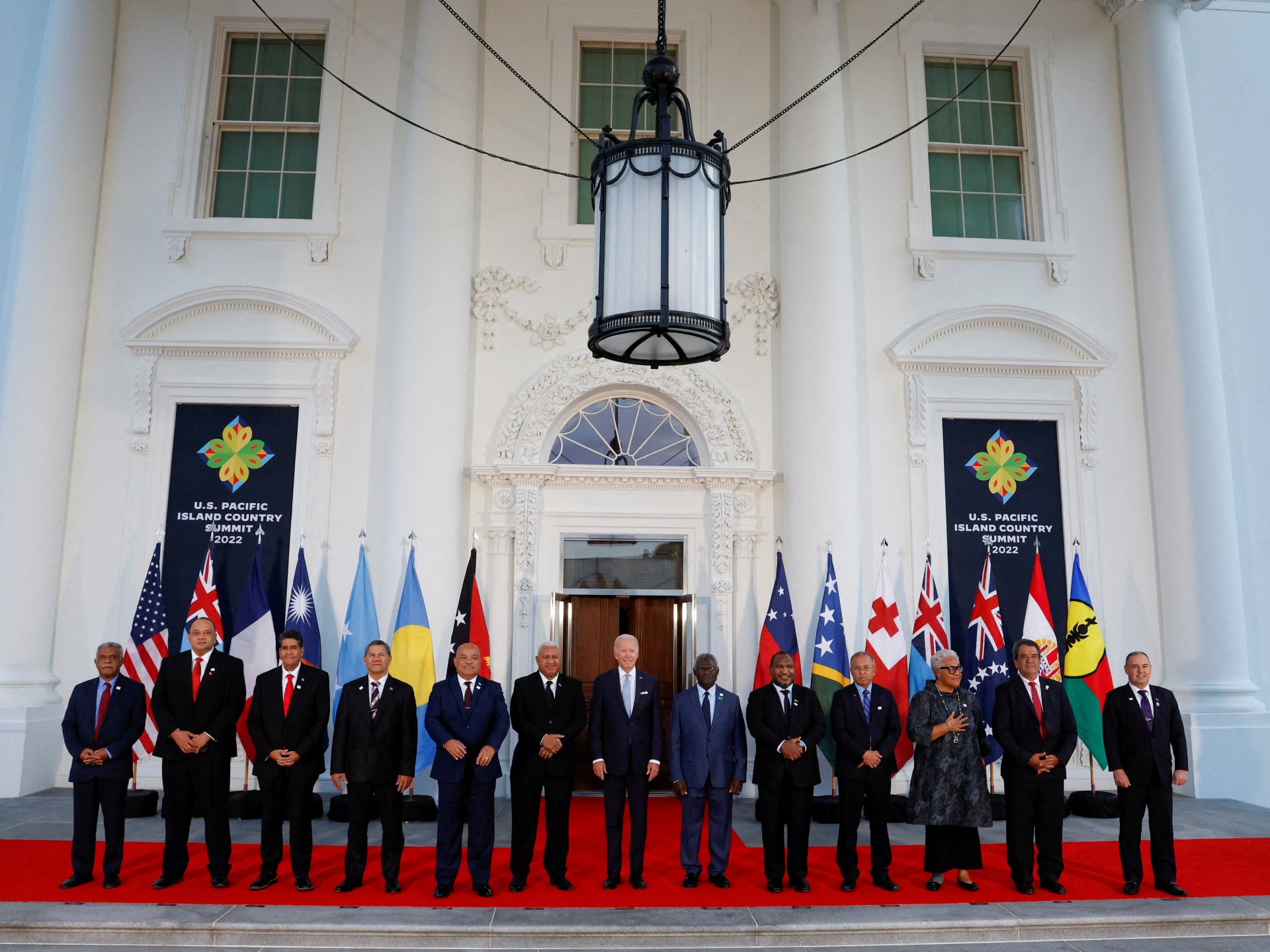Announcement comes as US President Joe Biden prepares to host a second summit with Pacific Island leaders in Washington DC.
Joe Biden, the president of the United States, is set to announce the opening of new embassies on the Cook Islands and Niue as part of a charm offensive to block Chinese inroads into the South Pacific.
The announcement about the new diplomatic missions on Sunday came as Biden prepared to welcome Pacific Island leaders to Washington, DC, for a two-day US-Pacific Island Forum Summit.
Talks are expected to heavily focus on the impact of climate change in the region.
Biden has put a premium on improving relations in the Pacific amid rising US concerns about China’s growing military and economic influence. Plans about the embassies were confirmed by two senior administration officials who briefed reporters on the condition of anonymity before the formal announcement.
White House press secretary Karine Jean-Pierre said Biden would use the summit to strengthen “ties with the Pacific Islands and discuss how we address complex global challenges, like tackling the existential threat of climate change, advancing economic growth, and promoting sustainable development”.
The leaders were scheduled to be feted on Sunday at a Baltimore Ravens football game and to visit a Coast Guard cutter in Baltimore Harbor for a briefing by the commandant of the US Coast Guard on combatting illegal fishing and other maritime issues.
Pacific Island leaders have been critical of rich countries for not doing enough to control climate change despite being responsible for much of the problem, and for profiting from loans provided to vulnerable nations to mitigate the effects.
At last year’s summit, the White House unveiled its Pacific strategy, an outline of its plan to assist the region’s leaders on pressing issues like climate change, maritime security and protecting the region from overfishing. It pledged the US would add $810m in new aid for Pacific Island nations over the next decade, including $130m on efforts to stymie the impacts of climate change.
Meg Keen, director of Pacific Island Programs at Australia’s Lowy Institute, said that while the US had opened new embassies and USAID offices in the region since last year’s summit, Congress had yet to approve the funds.
She added that Pacific island countries “welcome the US re-engagement with the region but don’t want geopolitical tussles to result in an escalation of militarisation”.
The Pacific Island forum includes Australia, the Cook Islands, Micronesia, Fiji, French Polynesia, Kiribati, Nauru, New Caledonia, New Zealand, Niue, Palau, Papua New Guinea, Republic of Marshall Islands, Samoa, Solomon Islands, Tonga, Tuvalu and Vanuatu.
The White House said most members of the 18-member forum were dispatching their top elected official or foreign minister to the summit.
But the administration was “very disappointed” that Solomon Islands Prime Minister Manasseh Sogavare, who was in New York last week for the United Nations General Assembly, opted not to stick around for the White House summit, according to an official.
The Solomon Islands last year signed a security pact with China.
Prime Minister Meltek Sato Kilman Livtuvanu of Vanuatu is also expected to miss the summit. He was elected by legislators earlier this month to replace Ishmael Kalsakau, who lost a no-confidence vote in parliament for actions including signing a security pact with US ally Australia.
The US is still negotiating to open an embassy in Vanuatu but has not significantly increased its engagement with the nation, which counts China as its largest external creditor. China last month sent police experts to Vanuatu and signed a policing agreement.
The US’s efforts to deepen engagement with the Pacific Islands this year also include opening embassies in the Solomon Islands and Tonga and renewing agreements with Palau and Micronesia that give it exclusive military access to strategic parts of the Pacific.
The US has yet to renew a similar agreement with the Marshall Islands, which wants more money to deal with the legacy of large-scale US nuclear testing in the 1940s and 50s.
A Biden administration official said it was confident of concluding a deal with the Marshall Islands.
